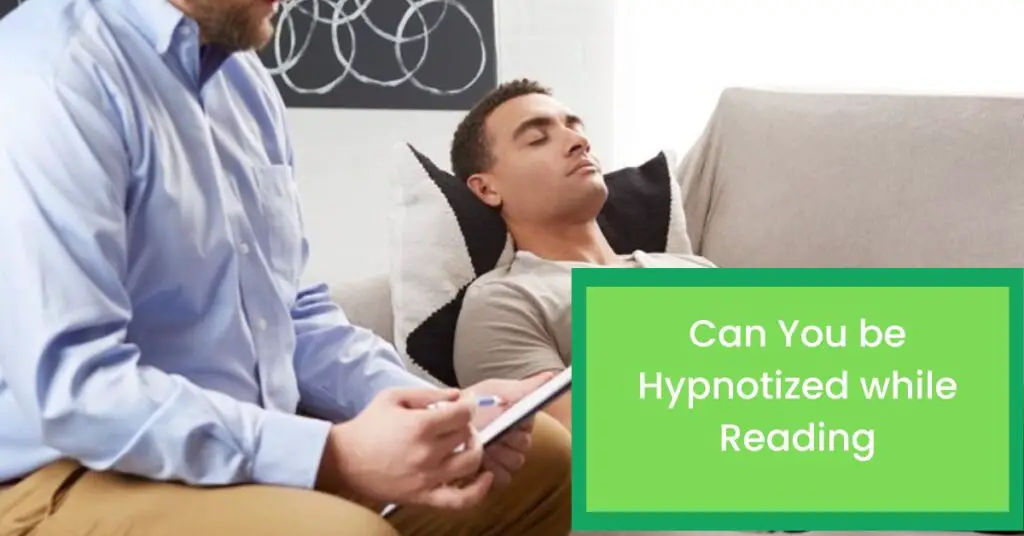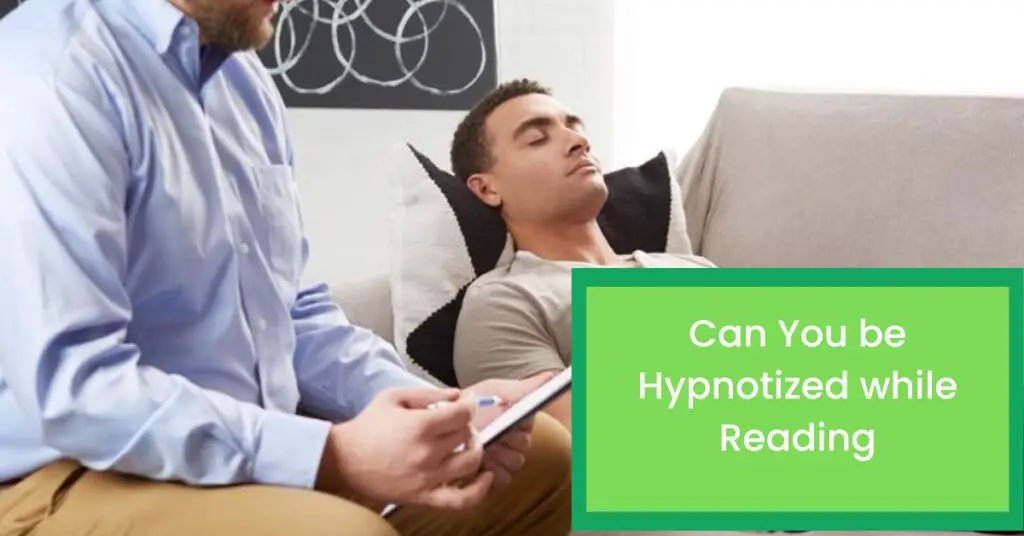Hypnosis is a trance-like state that can be induced through different means. It can be self-induced by focusing on certain thoughts or images, or it can be done with the help of a professional hypnotist. This article will look at a common matter: Can You be Hypnotized while Reading?
The simple answer is yes. You can be hypnotized while reading, and you can also be hypnotized by listening to audio books or even watching television. In fact, any time you are paying attention to something, you have the potential to be hypnotized.
But does that mean that everyone who reads or listens to books can be hypnotized? The answer is no. Only those people who are open-minded and willing to be hypnotized will be able to enter into a trance state.
In fact, you may have already been hypnotized without even realizing it. Next time you’re reading a book, pay close attention to the words on the page. Notice how your mind begins to wander, and you start to lose focus. That’s Hypnosis in action!
Overall, this can be a great way to relax and escape from the stresses of everyday life. It can also be helpful for those who want to learn more about Hypnosis and how it works.
Hypnosis Means (In Reading)
When you can focus and read easily, you’re in a hypnotic trance.
Being “in hypnosis” means that your mind is focused and receptive. It’s a very natural state that we all regularly enter – for example, when we’re absorbed in a good book or movie, driving on a familiar route, or deep in thought.
In each of these cases, our mind is focused and receptive, which allows us to experience the story or thoughts without interruption.
Reading is no different. When you’re able to focus on the words and read them effortlessly, you’re in a hypnotic trance. This doesn’t mean that you’re asleep or under someone else’s control – it simply means that your mind is open and receptive to the information in front of you.
Signs of Hypnosis
There is no one definitive answer to the question of signs of Hypnosis, as the signs of Hypnosis can vary depending on the person. Generally, when a person is in a state of Hypnosis, they will be unaware of their surroundings and may seem to be in a trance. They may also exhibit some or all of the following signs:
– Loss of focus or concentration
– Glazed eyes
– Dull expression
– Fixation on one spot
– inability to respond verbally or physically
– Excessive yawning
If you are trying to determine whether someone is in a hypnotic state, it’s important to note that there is no single test that will provide a conclusive answer; instead, you’ll need to use your best judgement based on the individual’s behaviour and appearance.
Potential Risk being Hypnotized
– Terrible Headache: Yes, it is possible to experience a headache after being hypnotized, but the risk is very minimal. Most people will not experience any side effects after being hypnotized. However, if you are someone who is susceptible to headaches, then there is a small chance that you may experience a headache after Hypnosis.
Headaches are usually caused by stress or tension in the head and neck muscles. So if you are relaxed and calm after Hypnosis, then you are less likely to experience a headache. However, if you feel stressed or anxious after Hypnosis, this may increase your risk for a headache.
– Drowsiness: Yes, drowsiness is a potential risk when being hypnotized. This is because Hypnosis causes a state of deep relaxation, which can lead to a person becoming sleepy. It’s important to listen to the hypnotist and follow any instructions they give you so that you remain safe and don’t risk falling asleep.
– Dizziness: It’s possible for someone to faint during Hypnosis if they are sitting or standing too quickly after being in a relaxed state. However, the risk of fainting is no greater than it would be if the person were not hypnotized.
Most people feel quite lightheaded and dizzy when they first enter into a hypnotic trance because blood flow has slowed, and they are breathing more slowly. This feeling usually passes within a minute or two. Fainting rarely happens, but if you feel like you’re going to faint, tell the hypnotist immediately, and they will help you to regain your balance.
– Situational Anxiety: Answer: It is always important to disclose any history of anxiety or mental health conditions to your hypnotist before beginning any hypnosis session.
Situational anxiety (i.e., anxiety that is specific to a certain situation, such as giving a presentation or speaking in public) does not usually pose a risk of being hypnotized. However, generalized anxiety (i.e., anxiety that is present most of the time and is not limited to specific situations) can be a challenge for some people when trying to enter into a state of Hypnosis.
If you are experiencing generalized anxiety, it may be helpful to talk with your hypnotist about ways to lower your overall level of anxiety before beginning the hypnosis session. This could involve deep breathing exercises, progressive muscle relaxation, or visualization techniques.
Precautions to Overcome Hypnosis
1. Don’t be afraid to ask questions. A lot of people believe that they can’t ask questions during Hypnosis, but this isn’t true. Asking questions can actually help you to focus and achieve a deeper state of relaxation.
2. Make sure that you trust the person who is hypnotizing you. If you don’t feel comfortable with the person, it’s likely that you won’t be able to relax fully and benefit from the experience.
3. Be prepared to work hard. Overcoming Hypnosis takes effort and focus, so be prepared to put in some work if you want to see results.
4. Don’t try to force it. If you’re having trouble relaxing, don’t worry. Just take a few deep breaths and allow yourself to let go. It may take time for some people to relax completely, but eventually, you will get there.
5. Expect to feel a sense of relaxation and calm. The goal of Hypnosis is to achieve a state of deep relaxation, so you should expect to feel relaxed and at ease when you’re finished.
6. Don’t worry if you don’t feel any different after the first session. Some people experience changes after the very first session, while others may need a few sessions before they start to see results.
Positives of Hypnotized
– Get through pain
– Get through depression
– Weight Loss
– Stress Disorder
Related Matters
01. Can you be hypnotized by text?
Yes, it is possible to be hypnotized by text. In fact, there are many people who are able to be hypnotized by text quite easily. There are also a number of people who find it difficult or even impossible to be hypnotized by text.
It really depends on the person and their state of mind. However, if you’re interested in trying it out, you can do a few things to increase your chances of success.
First, make sure that you’re in a relaxed state when you read the text. It’s important to be as relaxed as possible so that your mind is more open to suggestions. You can try sitting or lying down in a comfortable position and taking some deep breaths before
02. How do you tell if you are being hypnotized?
There are a few ways to tell if you’re being hypnotized. One way is to pay attention to your breathing. If you notice that your breath is becoming shallow and your heart rate is slowing down, it’s likely that you’re entering into a state of Hypnosis.
Another way to tell is by paying attention to your body. If you feel like you’re sinking into the chair or sofa, or if your limbs feel heavy, those are also signs that you’re being hypnotized.
Finally, most people who are being hypnotized will experience what’s called “eyelid flutter.” This happens when your eyelids start blinking rapidly and involuntarily. If you experience any of these signs, it’s likely that you’re being hypnotized.
03. What Hypnosis can not do?
Most people think of Hypnosis as a way to get people to do things they wouldn’t normally do, like clucks like a chicken or quack like a duck. However, those who are properly trained in hypnotism know that it can be used for much more than that. At its core, Hypnosis is simply a way to help someone focus their attention and enter into a state of deep relaxation.
There are many things that Hypnosis cannot do. It cannot make someone do something against their will. It cannot control another person’s mind or force them to think about something against their wishes. Hypnosis cannot change someone’s essential nature – if someone is shy, introverted, or nervous by nature.
04. Can you be hypnotized into studying?
Yes, you can be hypnotized into studying. However, it’s important to note that Hypnosis is not a “magic pill”, and it won’t work for everyone. Some people are more responsive to Hypnosis than others, and some find it easier to be hypnotized if they are relaxed.
If you’re interested in using Hypnosis to study, it’s important to find a qualified hypnotist who can help you achieve your goals. Remember that Hypnosis should never be used as a substitute for regular studying or good habits – it should only be used as an additional tool to help you reach your goals.
05. Can you hypnotize yourself?
Yes, you can hypnotize yourself. All you need is a quiet place where you won’t be disturbed and enough self-awareness to be able to focus on your own thoughts and imagery.
The best way to hypnotize yourself is through visualization. For example, imagine that you’re in a place where you feel very safe and comfortable. Maybe it’s a sunny beach or a beautiful garden. As you focus on the peaceful images in your mind, allow yourself to relax more and more until you feel completely calm and at ease.
You can also use self-hypnosis to achieve specific goals, such as improving your sleep or quitting smoking. The key is to be patient and consistent with your practice to make the positive changes permanent.













